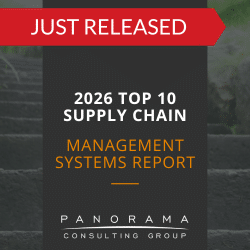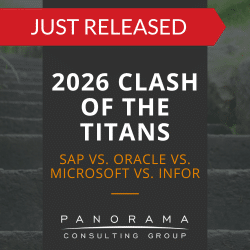Key Takeaways
- Healthcare ERP systems streamline finance, HR, and supply chain operations, improving efficiency and regulatory compliance.
- ERP technology alone isn’t enough—business consulting ensures alignment with organizational goals and processes.
- Business management consulting adds value through process design, change management, and data governance.
- Healthcare ERP projects face unique challenges, including legacy systems, regulatory demands, and clinical–administrative complexity.
- A combined ERP and consulting approach helps healthcare organizations achieve sustainable transformation and stronger adoption.
As healthcare organizations navigate increasing pressure to modernize operations, reduce costs, and improve patient outcomes, many are turning to ERP in healthcare to streamline their systems. Yet for all the potential that ERP systems in hospitals and healthcare offer—from supply chain optimization to real-time financial reporting—the technology alone is not enough to achieve sustainable transformation.
Without a strategic approach to people, processes, and data, even the most powerful ERP software in healthcare can fall short. This is why forward-thinking organizations are pairing ERP implementations with business consulting.
Let’s look at the role of ERP in healthcare, its limitations when implemented in isolation, and how business consulting fills the critical gaps to ensure transformation success.
The 2025 ERP Report
72.6% of respondents said they've already deployed AI at their organizations. Learn about AI adoption and other ERP trends by downloading our latest report.
The Strategic Value of ERP in Healthcare
Healthcare organizations—from large hospital networks to regional health agencies—face a growing need to operate more like agile businesses. Rising operational costs, complex compliance requirements, and growing patient expectations demand better coordination between departments and systems.
That’s where enterprise resource planning for hospitals comes in. ERP platforms consolidate core functions like finance, procurement, human resources, and supply chain management into one unified system. The benefits of ERP in healthcare include:
- Centralized Financial Management: Unified accounting and reporting systems enable real-time budget tracking and regulatory compliance.
- Improved Procurement and Inventory Control: Standardized purchasing processes help hospitals reduce waste, eliminate stockouts, and negotiate better contracts.
- Integrated HR Capabilities: From credential tracking to union-specific payroll workflows, ERP systems help manage complex staffing models.
- Data-Driven Decision-Making: ERP systems create a single source of truth, reducing the risk of data silos and enhancing operational transparency.
Example: A multi-hospital network might implement ERP software in healthcare to consolidate procurement operations, leading to a 20% reduction in redundant purchasing and a 30% improvement in inventory turnover by better aligning demand forecasting with clinical usage.
Despite these benefits, the success of ERP in healthcare environments hinges not only on the technology but also on how well the project is aligned with the organization’s processes and people.
ERP Alone Doesn’t Deliver Transformation
Challenges commonly include:
- Poorly defined business processes that persist after go-live
- User resistance due to insufficient change management
- Lack of alignment between system functionality and strategic goals
Without proactive planning and oversight, organizations risk investing millions into a system that reinforces outdated practices.
That’s why the best ERP consultants advocate for an integrated approach combining ERP with structured business consulting that addresses organizational readiness, stakeholder engagement, and process optimization.
Why Business Consulting is Essential to ERP Success
Key ways consulting enhances ERP success:
- Business Process Management: Consultants assess current-state processes and design future-state models that align with strategic goals.
- Organizational Alignment: Through stakeholder engagement and role clarity, consulting helps ensure ERP systems align with the needs of all departments.
- Change Management: Effective training and communication strategies reduce resistance and accelerate adoption.
- Data Governance: Consultants help define how data will be standardized, maintained, and used across the enterprise.
Example: A large academic medical center might implement an ERP system ahead of a new hospital expansion—without reviewing its HR and credentialing processes. As a result, the system struggles to manage new hires efficiently. Working with business consultants could help the organization realign the ERP’s configuration with union agreements and credential workflows, improving onboarding timelines.
Unique Challenges in Healthcare ERP Projects
- Legacy Systems and Data Silos: Clinical and administrative data are often stored in disconnected systems, making integration a major challenge.
- Regulatory Complexity: ERP must support HIPAA compliance, reporting to multiple agencies, and audit trails across departments.
- Workforce Constraints: Clinical and non-clinical staff often have limited availability for training.
- Clinical–Administrative Tension: Aligning workflows between front-line clinicians and back-office teams requires thoughtful process design.
Without experienced business software consultants, like Panorama Consulting, guiding data migration and change management, these challenges can derail even the most well-intentioned ERP initiative.
ERP + Business Consulting: A Unified Path to Results
To realize the full benefits of ERP in healthcare, technology must be matched with strong business strategy. That means designing systems around future-state processes, not just replicating legacy ones. It means empowering people to use new tools and ensuring that data flows seamlessly across the organization.
When Panorama leads a digital transformation project in healthcare, we align People, Processes, Technology, and Data to ensure the ERP system supports—not hinders—organizational goals. Hospitals, health systems, and public health agencies that take this integrated approach are more likely to see lasting improvements in cost efficiency and care coordination.
Contact our independent ERP consultants to learn more.













